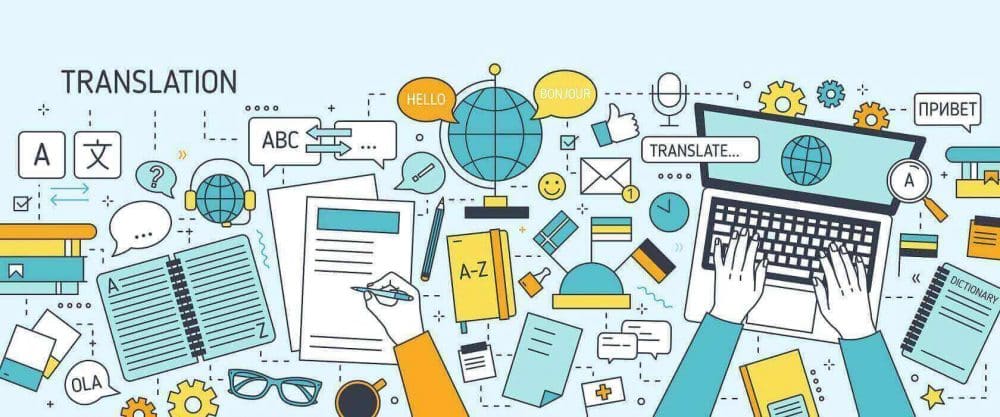With the world becoming more and more open, it should come as no surprise that translation services, whether they are aimed specifically at companies or private individuals, are thriving.
Not knowing a language is no longer a barrier for those who want to move or travel abroad – however, there are certain situations in which, regardless of whether you know the language or not, you will need to use the services of a professional translator. Depending on the situation, a different kind of translation service would be required.
The different types of translation are precisely what we will be discussing below, so if you’re interested in understanding what translation services are available to you, you’re more than welcome to stick around.
Professional Translation
In the simplest terms, professional translation is any kind of translation in which the result will be used for professional purposes. The two most common types of professional translation are medical translation and legal translation.
Medical Translation
If a translator specializes in medical translation, it means that they mostly translate documents and learning materials related to healthcare.
Some examples of documentation a medical translator takes care of include:
- medical records
- documentation for insurance purposes
- academic papers and other scientific publications
- clinical tests
- patient information leaflets and labels
Becoming a medical translator is no easy feat, especially since it comes with a huge responsibility and requires being very meticulous. Even a small error in translating, for example, someone’s documentation, can sometimes result in serious consequences for the patient.
In most cases, it’s not enough to have linguistic skills – most professionals in this field completed special training that allows them to better understand and learn medical jargon, as many medical pieces include information that only someone who studied the subject matter would understand. They also constantly educate themselves due to the number of changes regularly occurring in the medical field.
Legal Translation
Legal translation is one of the more complex types of translation, and, as the name suggests, it involves translating legal documents such as birth certificates, marriage certificates, contracts, wills, agreements, and so on.
However, that’s not all, as legal translation sometimes involves more than text – it can include transcription and translation of audio or video files, such as CCTV footage or witness reports.
The political, social, and business-specific contexts are extremely important when translating legal documents. There might be a situation where a specific legal construct exists in one country and not in the other – legal translation services providers are trained to know exactly what to do in that case.
Legal document translation needs to be done precisely, as even one mistake can cause it to become invalid. However, that’s not all – depending on the error that was made, a translation mistake can, in severe cases, cause companies to lose a lot of money.
Have you heard about the Oxford comma case that happened in Maine? While it wasn’t related to translation, it perfectly shows how important checking your legal documents multiple times is. Three drivers from a company called Oakhurst Dairy argued in court that they were owed years of overtime, all due to a simple punctuation mistake in the legislation that governed overtime payments.
The legislation went as follows, stating that workers who took part in: “the canning, processing, preserving, freezing, drying, marketing, storing, packing for shipment or distribution of: 1) agricultural produce; 2) meat and fish products; and 3) perishable foods” weren’t eligible for overtime pay.
However, the workers argued that since there was no comma between “or” and “distribution”, “packing for shipment or distribution” should be considered as one, and therefore didn’t apply to them. In the end, the US Court of Appeals ruled in their favor, and over a hundred of the company’s drivers were paid the overtime, costing them millions of dollars – all because of (or lack of) a coma. The legislation was also rewritten, this time using semicolons, removing the ambiguity.
Judicial Translation
Judicial translation is a type of legal translation, and it refers to the translation of documents related to court, such as court proceedings, depositions, expert and witness testimonies, as well as documents related to legal processes, for example, marriage certificates.
Technical Translation
Professional translator specializing in technical translation works on technical materials, which is quite a broad category, involving documents such as:
- user manuals and how-to guides
- quality control documents
- handbooks (for example, operational or employee handbooks)
- API documentation
- patent documents.
Technical translation is one of the types of translation that requires a human translator – no matter how much someone tries, machine translation will never be as accurate as a translation done by a person who has knowledge of the specific field and knows the proper terminology.
Commercial Translation

Commercial translation involves the translation of documents and materials related to business and its communication with customers. This type of translation is typically done by translators that have experience within the business world. Commercial translations can involve content such as:
- business correspondence
- brochures
- catalogs
- marketing and promotional materials
- reviews
- trade fair materials
When it comes to commercial translation, it’s important to keep the tone and style of the original document, as they are specifically crafted to ‘work’ while still adjusting the text to the audience it is going to be presented to.
Localization of the materials can often impact how customers perceive the brand, especially if it’s one they haven’t seen before. If a company makes an effort to fit within the market they’re trying to enter, they might be deemed as more accessible, therefore encouraging more people to check them out.
Administrative Translation
Administrative translations refer to the translation of administrative texts a business, government body, or other organization uses on a daily basis to perform administration and management tasks. Translating them ensures that there’s no interruption in their processes due to a language barrier.
Some of the texts that fall under the category of administrative translation include:
- memos and minutes of a meeting
- internal and external communication
- reports
- presentations
- customer service cases
- operating procedures
- organizational policies
Financial Translation
Financial translation is the process of translating financial documents, such as account statements, balance sheets, or bank records, into another language.
With so many companies nowadays going global and having shareholders from countries other than their own, financial translation has become an integral part of the business world.
After all, you want to keep people investing in your company in the loop, and it’s not possible if there’s a language barrier between you – financial translation ensures that all parties clearly understand the situation and can make fully informed decisions, which is especially important during business transactions such as international mergers, acquisitions and more.
Literary Translation

Literary translation is, as you can guess from the name, a translation of a literary text, such as a novel, a poem, a short story, and so on.
Literary translation projects are often considered to be one of the hardest forms of translation, especially when it comes to poems. Since they contain rhymes, puns, idioms, etc., it can be really difficult to accurately translate the whole text without losing its nuance.
Just think about it – have you ever tried to translate a joke from one language to another? It probably made perfect sense in the original language, but once you tried to translate it, the humor of it simply… disappeared, or at least it wasn’t as funny as it would’ve been when told in that first language.
The uniqueness of languages, while beautiful, also causes things to easily get lost in translation.
This is not to mention simply the volume of some of the texts that require translation. As an example, Les Miserables, which is one of the longest novels ever written, having almost 2000 pages in the French version, has been translated into over 20 languages.
Script Translation
Script translation focuses on translating scripts for movies, TV shows, as well as other video content into multiple languages. With more international movies rising to fame these days, the need for script translation increases.
General Translation
The final type of translation we’re going to be talking about is general translation. This refers to the process of translating non-specialized documents for which knowledge of specific terminology is not needed. Some of the texts that could be considered as part of this category include:
- CVs and job applications
- blog articles
- travelogs and other journalistic texts
and more.
General translation is often used for short texts that only need to be translated once and that will be read by multiple people.
How Does a Translation Process Look?
Now that you know about different types of translation, let’s take a look at how the translation process goes. It’s actually pretty straightforward, although, depending on the text or document a professional translator is working on, different amounts of research might be required.
So, here’s how most professional translators work:
- Receival of the document or text that needs to be translated.
- If needed, extensive research. Translation from the source language to the target language.
- Comparison between the original text and the translation to make sure nothing has been missed. If available, also editing is done by another person to ensure that proper terminology has been used and the style and voice of the translation match what is expected of the document.
- Formatting the text so it looks as closely to the original as possible.
- Final reading and delivering the translated text or document to the client.
How to Choose the Right Translator?
With the growth of the translation industry, it has become even harder to decide which translation services provider to go with for your translation project. And while the final decision is up to you, here are some things you might want to consider when making it:
- Consider the translation types – Under which of the translation types does your project fall? It’s important to understand your needs as best as possible, as then you’ll be able to choose a translator that fits them perfectly. For example, if you’re in need of a literary translation, choosing someone specializing in technical translation, commercial translation, or administrative translation might not be a good idea.
- Check out online reviews – You never want to go in blind, especially when it comes to something as important as a translation services provider. There’s no denying that the best marketing is word of mouth, but if there’s no one you can ask for recommendations, looking at online reviews is your second-best bet. People love to talk about their good experiences, but what they love even more is talking about the bad experiences they had – if something went wrong during the cooperation, you can be sure that they will mention it in the review.
- Always opt for a human translator – This is especially true for those translation projects that require specific expertise. If you can, choose a human translator over machine translation – context matters a lot when translating, and machine translation tools such as Google Translate are often unable to fully comprehend it and, therefore, translate the text accurately.
The Bottom Line
In today’s world, where translation services are needed more than ever, choosing the right translator for the job can be quite a hassle – more than it has been until this point, all because of the number of different types of translation available.
While it might seem like becoming a translator is enough to be able to take care of all kinds of texts, that is not necessarily true. In fact, not all professional translations can do all types of translation, as while they probably have the linguistic knowledge, they might not have the field-specific expertise needed to accurately translate certain texts.
That’s precisely why doing research is so important when choosing professional translation service providers for your translation needs.
At Lighthouse Translations, we understand the significance of a perfect client-translator match. During our two decades in the business, we have managed to fill our team with professionals specializing in several types of translation mentioned above.
So, next time you’re in need of professional translation services that match what we can provide you with, don’t hesitate to reach out to us for a free quote.

